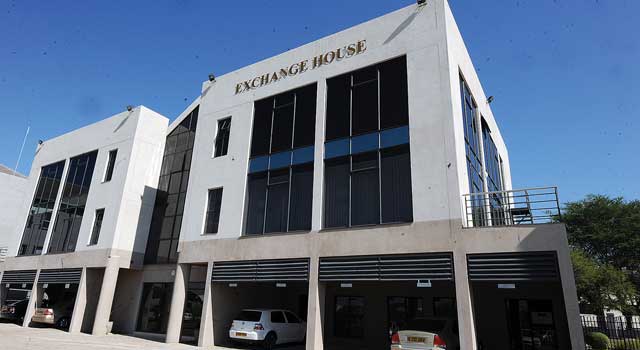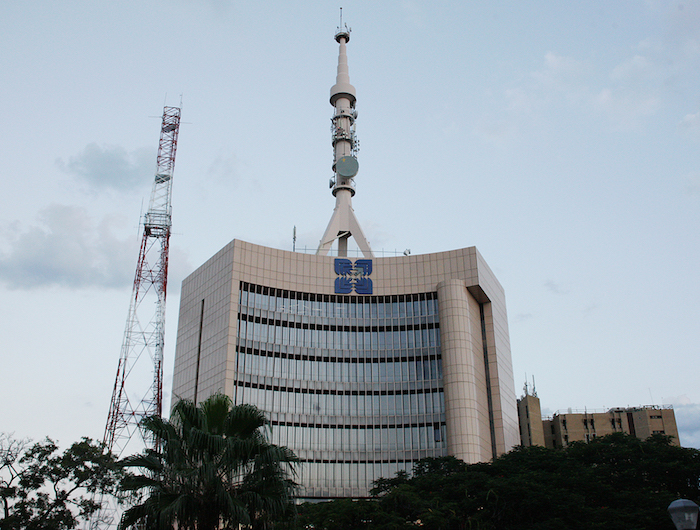The Botswana Stock Exchange’s benchmark index is at its lowest levels last seen two years ago as investors favourites crumble while small cap stocks punch above their weight. The BSE’s domestic company index is down by 11.63%, a stark contrast to 2015 when then stock tracking index appreciated by 11.65%. We take a look at the top gainers and losers.
The DCI which comprises of 21 listed local companies on the main domestic counter and 2 on the venture capital board is a market weighted index. That means it is sensitive to the performance of companies with large market capital value. In 2015, the share prices of 16 companies appreciated compared to 12 companies this year. It has turned out to be the most frustrating year for investors: the local interest rates are at their lowest in over 23 years, inflation rates for most of the year has been bubbling under the central bank’s 3-6% medium term range, while the economy has been sluggish with increasing job losses across the sectors.
When the economy is under duress, analysts say the markets will be the first to reflect those cracks. The decline of the DCI hence comes as little surprise given the prevailing economic circumstances. Listed companies annual reports have been characterised by leading terms such as “tough trading conditions”, “stagnated wages”, “weak economic growth”, and “increasing regulatory controls”.
The DCI’s decline this year serves as an example why investors are taught why it is never a good idea to put your eggs in one basket. Some sectors have been hit the hardest, resulting in negative and low returns for investors. However not all was lost as some sectors proved their resilience in the face of headwinds.
TOP GAINERS
Cresta-Up by 19.62%
The company has recently been in the news for the wrong reasons as the company found itself in a financial scandal that led to the dismissal of the Chief Financial Officer and the resignation of the Managing Director. Nonetheless the tourism and leisure company has outperformed domestic listed companies. The profits look good and the company is optimistic about future demand as it expands to top tourist destinations like Maun.
The company must be chuffed by the spotlight the country is receiving following the release of the United Kingdom film which depicts an actual love and political story of the founding president. It’s expected that the movie will arouse the curiosity of frequent travellers to come see the country where the film was shot.
Botswana Insurance Holdings Limited - 15.46%
Under the leadership of Catherine Lesetedi-Letegele, the financial services behemoth with three subsidiaries that spans the insurance and investment management sector has been a consistent performer throughout the year. The company has held its own in a sector that faces enormous challenges from intense competition, stagnated wages, falling premiums and increased claims from retrenchments. While analysts are closely monitoring the company’s stock, investors are cheering them on, buoyed by the company’s expansion plan.
The group took bold steps in increasing its product mix; from acquisitions to brokering deals with banks, tapping into bancassurance as well as looking at regional expansions. BIHL is a financial services titan originally established in 1975.BIHL has been listed on the Botswana Stock Exchange since 1991 and is the holding company for three subsidiaries (Botswana Insurance Fund Management, Botswana Life Insurance Ltd and Legal Guard) and holds a stake in two associate companies; Letshego Holdings and Funeral Service Group as well as a 21.5% stake in Nico holdings in Malawi.
Engen-Up by 15.15%
A surprise performance from the stock with a market valuation of P1.5 billion that really gets mentioned with the BSE’s blue chip stocks. What impresses the most about this stock is that it began the year down at -10%, dragged down by concern over oil prices which were also at their lowest from 2015 to early 2016. However the stock remained solid and pulled spectacular move when its share price started rising in line with improved market sentiments as oil prices begun to rise.
Chobe Holdings- Up by 13.23%
This tourism listed outfit is the second best performing stock in the tourism sector. The company ended the year with impressive financials: revenue was up by 33% and profits before tax increased by 45%. With its luxury lodges, the group will benefit from increased tourism activities. Through its wholly owned subsidiaries, Chobe Holdings Limited owns and operates ten eco-tourism lodges and camps on leased land in Northern Botswana and the Caprivi Strip in Namibia with a combined capacity of 290 beds under the brands Desert & Delta Safaris and Ker & Downey Botswana. Safari Air, a wholly owned air charter operator, provides air transport services to the group's camps and lodges.
Desert and Delta Safaris (SA) (Pty) Ltd, another wholly owned subsidiary operating in South Africa, provides reservation services to the group. This year, the group, through its wholly owned subsidiary North West Air (Pty) Ltd, acquired Air Charter Botswana (Pty) Ltd’s aircraft maintenance operation at Maun International Airport.
G4S- Up by 12.70%
Here is another company that began the year on a back foot following a dismal stock performance in 2015. Michael Kampani, G4s Managing Director, is leaving a happy man after he steered the group to profitability since he joined it in 2013. Under his leadership, G4s has focused on its core services as well as expanding its product mix. The stock market has taken note of his stellar performance as evidenced by the company’s share price appreciation.
Barclays Bank Botswana- Up by 12.22%
The bank this year was in its element, churning out new products and services and delivering impressive financial results. It is not a surprise that investors have been rallying behind the company which often touts its 5 year transformation strategy as something to reckon with. Indeed, the results show that the strategy is having some positive results.
The bank which seeks to be the leading bank in Botswana and your bank of choice doubled its profit in its interim results for the year. The second largest listed bank becomes the only one in the banking sector that has delivered capital gains to shareholders so far this year. With most financial institutions under pressure from the prevailing tough conditions, Barclays seems to be an exception to the rule as investors rally behind it.
NEW AFRICAN PROPERTIES- Up by 10.94%
This property listed stock deserves a special mention that extends beyond its exploits in the property market. Not only did it outperform property listed stocks, it also broke records on the BSE after the single biggest day trade in the history of the BSE after the company traded 26% of its issued capital worth P457.3 million. This year’s performance extends the gains the company enjoyed last year as it delivered 22%.
NAP was listed on the BSE in 2011, with a total of 604 397 124 issued units. The largest unit holder is Cash Bazaar Holdings (Pty) Ltd with 79.3 percent stake. NAP owns properties such as Riverwalk Mall, Riverwalk Plaza and Kagiso Mall in Gaborone, Mafenyatlala Mall in Molepolole, Kasane Mall and Mokoro Centre in Maun. The portfolio comprises primarily of prime retail sites with a strong tenant base, including Pick ‘n Pay, Spar, Choppies, Mr Price, Woolworths, Pep, Cashbuild, Furnmat, CB Stores, Ackermans, Cape Union Mart, Exclusive Books, FNB, Hi-Fi Corporation, Home Corp, Incredible Connection, Jet, KFC, Nando's, New Capitol Cinema, Mugg & Bean, JB Sports, Truworths and many others.
TOP LOSERS
Choppies-Down by 49.77%
The retail giant’s stock has been pummelled in the stock market, causing the biggest upset of the year as far as stocks are concerned. Choppies is a leading retailer in the fast moving consumable goods industry, targeting low-income to middle class buyers and the company has been doing well for the past 20 years, growing in leaps and bounds. The dual listed company, both in the BSE and Johannesburg Stock Exchange, has been pursuing regional expansions in the last two years. The company’s profit after tax nearly halved due to costs associated with the expansion.
What has been particularly worrying investors is that the expansion plans are yet to bring results. The South African and Zimbabwean Stores are still not making profits profits. Choppies faces other myriad challenges as its core customers’ disposable income diminishes through retrenchments while in Zimbabwe the recently rolled out bond notes will have an impact on the retailers operations.However, Ram Ottapathu led Choppies surprised many when it launched its own clothing line with its hyper stores. This move was seen in a positive light as it added a new revenue stream.
Furnmart- Down by 35.77%
This player also belongs to the retail and wholesaling sector that has been dragged down by economic factors. The Group continues to trade steadily in an ever more challenging environment. Drought conditions, currency weakness, high unemployment, an increase in retrenchments and the over-indebtedness of customers, continue to plague the region.
Low commodity prices on world markets and the slowdown in the Chinese economy have hampered growth in the countries in which Furnmart trades. The group says continued trading losses, a weakening economy, US Dollar-based rentals and a volatile currency have culminated in management’s decision to cease trading in Zambia
Furthermore, regulators continue to introduce burdensome restrictions and administrative processes on consumer credit providers, in an attempt to protect consumers from risky or unfair exposure.
Standard Chartered Bank Botswana- Down by 30.80%
The bank popularly known as Stanchart has extended its losses to 2016. The bank ended 2015 with a share price depreciation of about 11% and took the biggest fall this year. The financial sector, particularly banking, lists low interest rates, stagnated wages, unemployment and retrenchments as factors that have greatly impacted their operations. The bank’s 2015 end of year profit went down by 87% while the latest interim results reflect a decline in profits.
Stanchart was the first bank to publicly admit to its large exposure to the BCL Group which is under provisional liquidation. While the stock is being battered, the Moatlhodi Lekakau led bank is busy at work trying to turn around its fortunes. It has increased its bancassurance offerings and recently opened a digital bank branch at the country’s biggest airport.
FIRST NATIONAL BANK BOTSWANA- Down by 22.51%
FNBB is the largest bank in the country both by market value, industry profits and assets. This giant has been weakening since 2015 on the pressure of enhanced competition, the recently lifted moratorium on bank charges, low interest rates and limited spending power in the economy.
Steven Bogatsu finds himself in charge of a bank that recently reported its lowest profit in two years, continuing the trend of declining profits in the banking sector. In efforts to lure customers and get them to spend, the bank has introduced a number of initiatives such as smart devices scheme and ebucks rewards program. The bank has also bolstered its newly created insurance division, striking deals with BIHL, the country’s leading insurer.
Letshego- Down by 20%
This financial giant has made its fortunes from micro-lending, with its strong customer base made up of government workers and state owned enterprises. In the stock market, the company tops the charts of domestic companies in terms of volume and value of trades. Simply put, Letshego stock is the most liquid, exchanging hands quickly and easily. This could account for the stock’s decline this year.
The company which breached the P1 billion mark in revenue for the year ended 2015, released interim results for 2016 which showed declining profit. However the group says results show satisfactory growth in an environment of depreciating exchange rates, higher inflation and interest rates and lower economic activity in most of the markets in which Letshego operates.
In its 2015 annual report, Letshego says it will continue to drive its inclusive financial services strategy and to strengthen its operations through investment in people, technology and strategic partnerships. Moreover, the group’s Board of Directors is confident that the Pan African financial services titan is well positioned to benefit from the growing markets in which it is active and views inorganic expansion via strategic acquisitions as important to the acceleration of Letshego’s strategy.

































